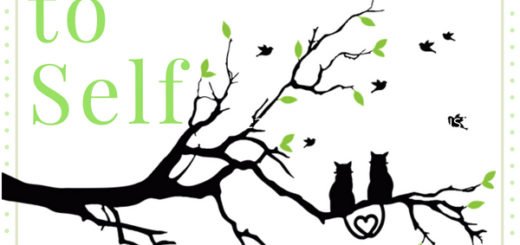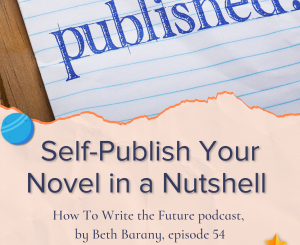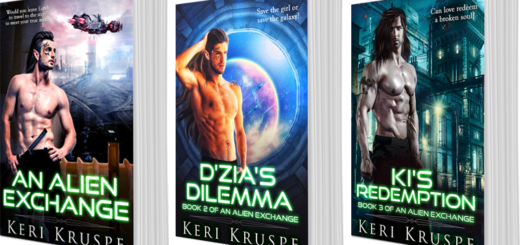Know Yourself (Part 4)
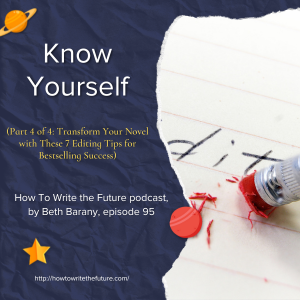
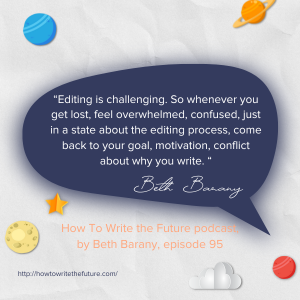
Know Yourself (Part 4/4) – How To Write the Future podcast, episode 95
“Editing is challenging. So whenever you get lost, feel overwhelmed, confused, just in a state about the editing process, come back to your goal, motivation, conflict about why you write.“
“Know Yourself” In episode 95 of the How To Write the Future podcast, Beth Barany explains the importance of knowing why you write, focusing on your strengths, and trusting your creative process including why you study sentence structure and knowing which grammar rules to break when. (Part 4 of 4: Transform Your Novel with These 7 Editing Tips for Bestselling Success)
Platforms The podcast is available on Apple Podcasts | Buzzsprout | Spotify | Podcast Addict |Amazon Music | Youtube
RESOURCES
12-month Group Mastermind Program for Science Fiction and Fantasy Writers – open for enrollment: http://coaching.bethbarany.com/
Free World Building Workbook for Fiction Writers: https://writersfunzone.com/blog/world-building-resources/
Sign up for the 30-minute Story Success Clinic with Beth Barany: https://writersfunzone.com/blog/story-success-clinic/
Get support for your fiction writing by a novelist and writing teacher and coach. Schedule an exploratory call here and see if Beth can support you today: https://writersfunzone.com/blog/discovery-call/
About the How To Write the Future podcast
The *How To Write The Future* podcast is for science fiction and fantasy writers who want to write positive futures and successfully bring those stories out into the marketplace. Hosted by Beth Barany, science fiction novelist and creativity coach for writers. We cover tips for fiction writers. This podcast is for readers too if you’re at all curious about the future of humanity.
This podcast is for you if you have questions like:
– How do I create a believable world for my science fiction story?
– How do figure what’s not working if my story feels flat?
– How do I make my story more interesting and alive?
This podcast is for readers too if you’re at all curious about the future of humanity.
Transcript for episode 95 – Know Yourself (Transform Your Novel with These 7 Editing Tips for Bestselling Success, part 4 of 4)
Hey everyone, Beth Barany here for how to write the future podcast. I’m your host and your guide, a science fiction and fantasy writer. Also a creativity coach and writing teacher. Today I am giving you the fourth part of this four-part series on how to transform your novel with seven editing tips for best-selling success.
So if you’re just coming in for the first time, go ahead and check the three previous episodes all lined up right before this one. And I hope you enjoy. So today I’m going to just dive right in.
I’m going to do numbers five, six, and seven. So excited to bring you these tips. All right.
And a little bit about How To Write The Future podcast.
We’re a podcast for science fiction and fantasy writers who want to write positive, optimistic stories because I believe that what we vision and what we write, we help make it so.
Also, this podcast is to help you bring your stories powerfully out into the world, your unique stories that speak from your heart to your reader’s heart. Because I believe that your vision of reality through your science fiction and fantasy story is just as valid as anyone else’s and deserves to be out in the world and in the hands of readers. All right.
So today I want to talk about my, five, six, and seven points. Just to recap into Wet Your Whistle, listen to the three previous episodes, I talked a little bit about my stance on editing, which is basically we write for ourselves and we edit for our readers.
I talked about what does it take to be a bestseller, my own take on that.
The importance of being an avid reader, knowing your genre, knowing your characters, and today. I’m going to talk about knowing yourself. Gathering your community. And the importance of words are your toolkit.
All right, let’s dive in. Now, if you are on video, you’ll be able to see some pretty slides. So let’s next talk about the importance of knowing yourself.
Oh, and I want to let you know that at the end, there’s a special invitation for you if you’d like to work with me and with and join us in editing your manuscript. And as we are in the fourth of this cycle, the fourth of four, I want to let you know that I have been doing this podcast while sitting on my couch, because my cat Rocket is on my lap. And he’s not happy when I’m sitting at my desk.
The importance of knowing yourself – why you write
So point 5, know yourself.
I think it is so important to know why you write in general.
And sometimes the answer is: I don’t know. And sometimes the answer is: I have something to say. And sometimes the answer is: all over the place and can change from day to day. So I really encourage you to spend time journaling on why you write. And I put GMC in parentheses here on the slide.
And that stands for goal motivation and conflict. Just as much as we want to know our characters, goals, motivations, and conflicts. And by the way, that comes from Deb Dixon’s book called Goal, Motivation and Conflict. I use it as a rubric to help me all the time when I’m not sure where to begin.
I start with goal, motivation, conflict.
So know why you write.
What’s important about this book?
Second. Why this book? What is important to you about this book? Editing is challenging. So whenever you get lost, feel overwhelmed, confused, just in a state about the editing process, come back to your goal, motivation, conflict about why you write. And also why this book, why is this book important to you? Even if it’s, I don’t know.
And it’s important. That’s great too. Go for it.
Why this book now?
Also, why now?
Sometimes we have an an undefinable urge to be working on this book and no other project.
And that’s okay. It’s important to recognize that now it is important to you.
Strengths, Blessings, Gifts
Also focus on your strengths, your blessings, and your gifts. What has been given to you from your upbringing?
What has been given to you from your education, from the education that you have done as an adult?
What are the blessings that you’ve been born with? What are the gifts that you have gathered together to be able to write your story now?
Trust Your Creative Process/Habits
Also, trust your creative process and develop good habits.
Write when is the best time for you.
People talk about writing first thing in the morning. That may not work for you. It doesn’t work for me. I’m not quite awake yet. I’d like to write around lunchtime. I know some writers love to write late at night. Others who write early in the morning. Some writers like my husband, Ezra, he can write any time of day. That’s so awesome.
Commitment
Also your commitment. How committed are you to this project?
Committed enough to keep at it even when the end seems so far away? Committed enough to just keep going one step in front of the other?
Be honest with yourself.
What is your commitment? So this is point 5: Know yourself.
And of course, I have so much more to say on this. I’m a coach.
I have a lot to say. So if you are interested in exploring this deeper, reach out. Let me know.
Community
A very important part of being successful author is having community. This is where I see a lot of writers stumble.
Have beta readers, critique partners, develop a reader’s list. Gather your colleagues, your peers. Be paying attention to who’s a fan of your work and also acknowledge supporters.
Friends and family who support you no matter what.
We teach you how to gather all of these in our 12-month group coaching program that I will tell you about in a moment.
And I just want to say there are a lot of online places you can find beta readers and critique partners. I encourage you to start a mailing list, an official mailing list as soon as you’re ready and find your colleagues and your peers, because really we may write alone, but we succeed together.
Words! Our Toolkit!
And lastly, but certainly not least- leastly- words are your toolkit. They’re my toolkit. We’re writers.
That’s what we do. We use words.
Be A Word Geek
Be a word geek. Look up words all the time. I do. Look up derivations. Almost every day, I’m looking at words and certainly, when I’m actively editing the manuscript, I am looking up words.
Study Sentence Structure
Study sentence structure from simple sentence structure to complex sentence structure.
Compound sentences. Modifiers, all of it. Learn how sentences are put together. It’s fascinating.
And we go deep into this in our 12-month mastermind group.
Know Grammar Rules to Break Them
Also know grammar rules so that you can break them. And if an editor or a beta reader says to you, oh, you can’t do that.
And you can say, sure. I know there’s the rule over here and know what the rule is say, but I’m doing it this way because this is how my character talks.
So don’t let anyone tell you, you have to follow the rules. We’re creative writers. We get to break the rules but know why you’re doing it.
So study those grammar rules.
Increase your Vocabulary – VAKOG
And then lastly, increase your vocabulary. I cannot tell you how many times I’ve seen manuscripts that have limited vocabulary is okay. But especially for sensory details, it really pays to have more words for visuals, auditory, kinesthetic olfactory, and gustatory.
Let me give you a breakdown of that.
V is for visual: what we see. A is for auditory: what we hear. K is for kinesthetic. It includes it’s the body sensations. But also we’re going to include the feelings, the emotions in there. O is for olfactory, which is smell. And G is for gustatory, which is taste. Increase your vocabulary here.
Learn how to say more than just run. That was my, one of my things. My heroine, Henrietta The Dragon Slayer, she ran everywhere. Oh my goodness. Someone pointed out to me in early days, they said, there are more words for run. Use a thesaurus. And that was a big aha for me.
I’m like, oh, of course. And then I started pay attention that you don’t always have to use an action movement verb.
I can talk about the emotion of how someone goes from place to place. I don’t have to say run or hop or skip or stride. I could say rushed or hurried or meandered.
Yeah, words are our toolkit.
Let’s Recap
So those are my seven tips for today for the series I want to invite you to. Let me go over those seven tips since we are at the end here.
I talked about in this four-part series, what does it take to be a best seller? Being an avid reader. Knowing your genre, know your characters, know yourself.
Today I specifically talked about knowing yourself. Gathering your community and how words are our toolkit. And now here is my special offer and invitation to you. If you would like support, in a small intimate group. And you’re a science fiction, fantasy writer. And you have finished that first draft, which by the way, congratulations. Oh my gosh. I totally know how amazing that is. Then you’re invited to come join our 12-month group mastermind to unleash your story’s potential. Transform your manuscript into a publish-ready masterpiece. In our 12-month group mastermind program, we teach and coach you to develop a discerning eye.
So you can do story edits and line edits in your own way, on your own story.
Now, there is an option to have one-on-one support with me in addition to the group where I will help you and teach you how to do story, or developmental edits and how to do line editing.
So what would life be if we had no courage to attempt anything? Vincent van Gogh said this.
Being a creative, being an artist is about courage because we need our courage in addition to curiosity. compassion connection. And I’m sure a whole host of other things because creativity is our superpower. And with the power of the imagination, we can remake our stories in our edits. We can remake our lives and we can also remake our world.
So once again, special offer. Reach out to me, email me, or sign up for a discussion if you would like to join our 12-month group coaching program and see if it’s right for you.
So specifically the invitation is to come join us for the 12-month group coaching program.
And if you’re not sure if it’s right for you, please reach out and email me and we can set up a time to talk or go ahead and schedule a time using my scheduler tool. We look forward to having you in our program, we have spots three more spots right now, and I’ll have one spot if you want to work just one-on-one with me.
All right. That’s it for this week, everyone. Please like and subscribe wherever you listen to this podcast, and if you’re on YouTube, same thing, like, and subscribe. Also, if you find this material really useful and you think, a friend of yours would also please, please, pass it on to your friend.
If everyone who listened just passed on this podcast who a friend they think would like then, wow, my reach would like double overnight. That would be amazing.
All right, everyone. So take care. Write your stories and write long and prosper.
Loved this episode? Leave us a review and rating here: https://www.buzzsprout.com/2012061 [H3]
ABOUT BETH BARANY
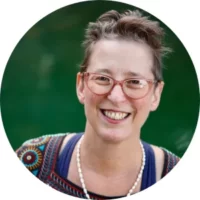
Beth Barany teaches science fiction and fantasy novelists how to write, edit, and publish their books as a coach, teacher, consultant, and developmental editor. She’s an award-winning fantasy and science fiction novelist and runs the podcast, “How To Write The Future.”
Learn more about Beth Barany at these sites:
Author site / Coaching site / School of Fiction / Writer’s Fun Zone blog
CONNECT
Contact Beth: https://writersfunzone.com/blog/podcast/#tve-jump-185b4422580
Email: beth@bethbarany.com
LinkedIn: https://www.linkedin.com/in/bethbarany/
IG: https://www.instagram.com/bethbarany/
TT: https://www.tiktok.com/@bethbarany/
FB: https://www.facebook.com/bethbarany
X: https://twitter.com/BethBarany
CREDITS
- EDITED WITH DESCRIPT: https://www.descript.com?lmref=_w1WCA (Refer-a-Friend link)
- MUSIC CREDITS : Music from Uppbeat (free for Creators!): https://uppbeat.io/t/soundroll/fuzz-buzz License code: UMMKDRL02DFGKJ0L. “Fuzz buzz” by Soundroll. Commercial license: https://musicvine.com/track/soundroll/fuzz-buzz.
- DISTRIBUTED BY BUZZSPROUT: https://www.buzzsprout.com/?referrer_id=1994465 (Refer-a-Friend link)
- SHOW PRODUCTION BY Beth Barany
- SHOW CO-PRODUCTION + NOTES by Kerry-Ann McDade
c. 2024 BETH BARANY
For more “How To Write the Future” episodes, go here.
If you’d like to invite Beth onto your podcast, drop her a note here.

